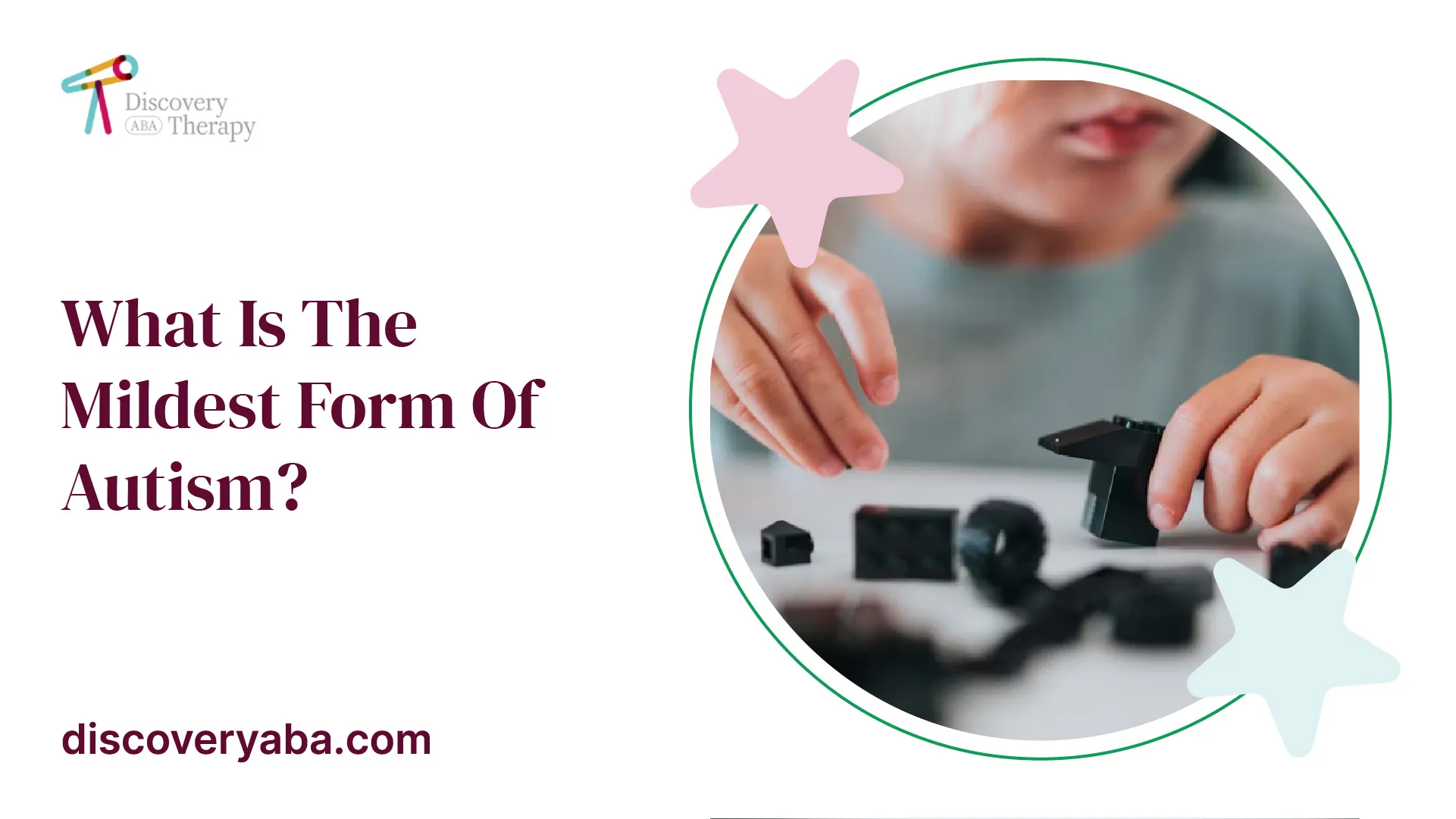What Is The Mildest Form Of Autism?
Curious about the mildest form of autism? Dive in to learn how autism is a spectrum disorder, with varying degrees of challenges in social interaction and communication.
.jpeg)
Understanding Asperger's Syndrome
Asperger's Syndrome is a condition that falls under the autism spectrum. It is considered to be a milder form of autism, characterized by difficulties in social interactions and repetitive behaviors. In this section, we will explore what Asperger's Syndrome is and its key characteristics and symptoms.
What is Asperger's Syndrome?
Asperger's Syndrome is a developmental disorder that affects how an individual perceives and interacts with the world around them. It is named after Austrian pediatrician Hans Asperger, who first described the condition in the 1940s. Asperger's Syndrome is now classified as part of the autism spectrum disorder (ASD).
Individuals with Asperger's Syndrome often exhibit average to above-average intelligence and have no significant delays in language development. However, they may struggle with social communication and interaction, as well as experience difficulties with empathy and understanding social cues.

Characteristics and Symptoms of Asperger's Syndrome
The characteristics and symptoms of Asperger's Syndrome can vary from person to person, but some common traits include:
- Social Challenges: Individuals with Asperger's Syndrome may struggle with understanding social norms and cues. They may have difficulty initiating or maintaining conversations, interpreting nonverbal communication, and forming friendships.
- Restricted and Repetitive Behaviors: People with Asperger's Syndrome often engage in repetitive behaviors or have highly focused interests. They may have rigid routines and prefer consistency in their daily lives. They may also exhibit intense interests in specific subjects or topics.
- Sensory Sensitivities: Many individuals with Asperger's Syndrome are hypersensitive or hyposensitive to certain sensory stimuli. They may be overly sensitive to sounds, lights, textures, or smells, which can cause discomfort or distress.
- Difficulty with Change: Individuals with Asperger's Syndrome often find it challenging to cope with unexpected changes or transitions. They may prefer predictable environments and routines.
- Specialized Interests: People with Asperger's Syndrome may have intense interests in specific subjects and demonstrate in-depth knowledge in those areas. These interests can be a source of motivation and provide a sense of purpose.
Each person with Asperger's Syndrome is unique, and not all individuals will exhibit every characteristic or symptom. The diagnosis and management of Asperger's Syndrome should be done by qualified healthcare professionals who specialize in autism spectrum disorders.
Understanding the characteristics and symptoms of Asperger's Syndrome is an essential step towards creating a supportive and inclusive environment for individuals with this condition. By recognizing and embracing neurodiversity, we can foster acceptance and understanding for people with Asperger's Syndrome and promote their overall well-being.
Embracing Neurodiversity
Understanding and embracing neurodiversity is an important aspect of creating a more inclusive and accepting society. This section explores the concept of neurodiversity and highlights the importance of celebrating differences and strengths.
What is Neurodiversity?
Neurodiversity is a concept that recognizes and values the natural variations in neurological development. It acknowledges that neurological differences, such as autism, ADHD, and Asperger's Syndrome, are simply part of the natural human diversity. Instead of viewing these differences as deficits or disorders, neurodiversity promotes the idea that these variations should be accepted and appreciated.
Neurodiversity challenges the notion that there is a single "normal" or "typical" brain, suggesting instead that there is a vast spectrum of cognitive abilities and ways of processing information. It emphasizes the unique strengths and talents that individuals with neurodivergent conditions possess, such as exceptional attention to detail, analytical thinking, and creativity.
Celebrating Differences and Strengths
Embracing neurodiversity means celebrating the differences and strengths of individuals with conditions like Asperger's Syndrome. Rather than focusing solely on the challenges they may face, it is essential to recognize and appreciate their unique abilities and contributions.
Individuals with Asperger's Syndrome often possess remarkable attention to detail and a deep focus on their interests. They may excel in areas such as mathematics, engineering, computer programming, or the arts. Their unique perspectives and ways of thinking can bring fresh insights and innovative solutions to various fields.
By appreciating the strengths and talents of individuals with Asperger's Syndrome, we can create a more inclusive society that values diversity and provides opportunities for everyone to thrive. It is important to foster environments that support their abilities, provide reasonable accommodations when needed, and promote understanding and acceptance among peers and communities.
To better understand the strengths associated with Asperger's Syndrome, let's take a look at some key attributes that individuals with this condition may possess:
Strengths
- Exceptional attention to detail
- Strong focus and concentration
- Analytical and logical thinking
- Creativity and originality
- Deep knowledge and expertise in specific areas
- Honesty and reliability
- Dedication and perseverance
Recognizing and celebrating these strengths can help create a more inclusive and supportive environment for individuals with Asperger's Syndrome. By embracing neurodiversity, we can foster a society that values and appreciates the unique abilities and contributions of all individuals, regardless of their neurological differences.
Living with Asperger's Syndrome
Living with Asperger's Syndrome can present various challenges and difficulties. However, with the right strategies and support, individuals with Asperger's can navigate these challenges and thrive in their daily lives.
Challenges and Difficulties
People with Asperger's Syndrome may face specific challenges that can affect different aspects of their lives. Some common difficulties associated with Asperger's Syndrome include:
- Social Interaction: Individuals with Asperger's often struggle with social interactions and may find it challenging to understand social cues, body language, and nonverbal communication. This can lead to difficulties in forming and maintaining relationships.
- Sensory Sensitivities: Many individuals with Asperger's experience heightened sensitivity to sensory stimuli such as noise, light, touch, or certain textures. These sensitivities can be overwhelming and may cause discomfort or anxiety.
- Rigid Thinking and Routine: People with Asperger's Syndrome often prefer routines and may have difficulty adapting to changes or unexpected situations. They may also exhibit intense interests or fixations on specific topics.
- Executive Functioning: Executive functioning skills, such as organization, time management, and planning, can be challenging for individuals with Asperger's. This can impact their ability to prioritize tasks, manage time effectively, and stay organized.
Strategies for Coping and Thriving
Despite the challenges, there are various strategies and techniques that can help individuals with Asperger's Syndrome cope and thrive:
- Social Skills Training: Social skills training programs can provide individuals with Asperger's the tools and strategies to navigate social situations more effectively. These programs focus on improving communication skills, understanding social cues, and fostering positive relationships.
- Sensory Management: Developing sensory management techniques can help individuals with Asperger's manage sensory sensitivities. This may include creating a calm and comfortable environment, using sensory aids like headphones or sunglasses, and practicing relaxation techniques.
- Routine and Structure: Establishing and maintaining a structured routine can provide a sense of predictability and stability for individuals with Asperger's. Having a daily schedule, setting goals, and breaking tasks into smaller, manageable steps can promote organization and reduce anxiety.
- Self-Advocacy: Encouraging individuals with Asperger's to advocate for themselves can empower them to express their needs, preferences, and challenges. This can involve educating others about Asperger's Syndrome, seeking accommodations in educational or work settings, and communicating openly with friends, family, and colleagues.
Remember, it is essential to recognize that each individual with Asperger's is unique, and strategies that work for one person may not work for another. It is important to tailor approaches to meet individual needs and preferences.
By understanding the challenges associated with Asperger's Syndrome and implementing effective coping strategies, individuals with Asperger's can lead fulfilling lives and embrace their unique strengths and abilities.
Supporting Individuals with Asperger's Syndrome
Individuals with Asperger's Syndrome benefit greatly from a supportive and inclusive environment that promotes acceptance and understanding. By creating such an environment, we can help individuals with Asperger's Syndrome thrive and reach their full potential. Here are two important aspects of support:
Creating an Inclusive Environment
Creating an inclusive environment is essential for individuals with Asperger's Syndrome to feel accepted and valued. It involves fostering an atmosphere that embraces diversity and recognizes the unique strengths and challenges of individuals on the autism spectrum. Here are some strategies to promote inclusivity:
- Education and Awareness: Increasing awareness and understanding of Asperger's Syndrome among peers, coworkers, and the wider community can help reduce stigma and misconceptions. Providing educational materials and organizing workshops or presentations can contribute to a more inclusive environment.
- Accommodations and Modifications: Making reasonable accommodations in various settings, such as schools or workplaces, can greatly support individuals with Asperger's Syndrome. These accommodations may include sensory-friendly environments, clear communication strategies, and flexible work or learning arrangements.
- Social Skills Training: Offering social skills training programs can assist individuals with Asperger's Syndrome in developing and improving their social interaction and communication skills. These programs can provide valuable guidance on understanding nonverbal cues, building relationships, and navigating social situations.
- Peer Support and Mentoring: Encouraging peer support and mentoring programs allows individuals with Asperger's Syndrome to connect with and learn from their peers. This can foster a sense of belonging and provide a supportive network for sharing experiences and advice.
Promoting Acceptance and Understanding
Promoting acceptance and understanding is crucial for creating a supportive environment for individuals with Asperger's Syndrome. It involves challenging stereotypes, advocating for inclusivity, and fostering empathy and compassion. Here are some ways to promote acceptance and understanding:
- Autism Awareness Initiatives: Supporting and participating in autism awareness initiatives, such as Autism Acceptance Month, can help raise understanding and acceptance of Asperger's Syndrome and other autism spectrum disorders. These initiatives often involve campaigns, events, and educational activities.
- Encouraging Open Dialogue: Encouraging open dialogue about Asperger's Syndrome can help dispel myths and misconceptions. Providing opportunities for individuals with Asperger's Syndrome to share their experiences and perspectives can foster empathy and understanding among others.
- Peer Education Programs: Implementing peer education programs in schools and communities can be an effective way to promote acceptance and understanding. These programs involve individuals with Asperger's Syndrome or other autism spectrum disorders sharing their experiences and providing insights into their unique perspectives.
- Promoting Inclusion in Media and Literature: Supporting and promoting media and literature that accurately portrays individuals with Asperger's Syndrome can help challenge stereotypes and promote acceptance. This includes books, movies, TV shows, and online content that showcase authentic and diverse representations of individuals on the autism spectrum.
By creating an inclusive environment and promoting acceptance and understanding, we can support individuals with Asperger's Syndrome in their journey toward a fulfilling and empowered life.
Resources and Support
Individuals with Asperger's Syndrome and their caregivers often seek resources and support to better understand and navigate the challenges associated with this condition. Fortunately, there are various professional services, therapies, online communities, and support groups available to provide assistance and a sense of community.
Professional Services and Therapies
Professional services and therapies play a crucial role in supporting individuals with Asperger's Syndrome. These services are designed to address specific needs and promote development and independence. Here are some common professional services and therapies for individuals with Asperger's Syndrome:
Service/Therapy and Description
- Occupational Therapy: Focuses on developing skills for daily activities, sensory processing, and motor skills.
- Speech Therapy: Aims to enhance communication skills, social interaction, and language development.
- Cognitive-Behavioral Therapy (CBT): Helps individuals manage emotions, improve problem-solving, and develop coping strategies.
- Social Skills Training: Focuses on teaching social cues, conversation skills, and appropriate social behavior.
- Educational Support: Includes individualized education plans (IEPs), accommodations, and specialized teaching methods to address learning needs.
These professional services and therapies can provide valuable support and guidance to individuals with Asperger's Syndrome, helping them navigate social situations, enhance communication skills, and build a foundation for success.
Online Communities and Support Groups
Online communities and support groups have become a valuable resource for individuals with Asperger's Syndrome and their caregivers. These platforms offer a sense of belonging, understanding, and a safe space to share experiences and seek advice. Here are some popular online communities and support groups for individuals with Asperger's Syndrome:
Online Community/Support Group and Description
- Autism Speaks Community: A platform that connects individuals and families affected by autism to share stories, find resources, and seek support.
- Wrong Planet: An online community for individuals with autism spectrum disorders, including Asperger's Syndrome, to connect and engage in discussions.
- Asperger/Autism Network (AANE): Provides online support groups, forums, and resources specifically for individuals with Asperger's Syndrome and their families.
- Reddit Autism Community: A subreddit dedicated to discussions and support for individuals on the autism spectrum, including those with Asperger's Syndrome.
These online communities and support groups offer a wealth of information, advice, and a supportive network of individuals who understand the unique challenges and experiences associated with Asperger's Syndrome.
By utilizing professional services, therapies, and engaging with online communities and support groups, individuals with Asperger's Syndrome can access the resources and support they need to thrive. It's important to remember that everyone's journey is unique, and finding the right combination of resources and support can greatly enhance the well-being and quality of life for individuals with Asperger's Syndrome.
Summary
It's important to understand that there isn't a one-size-fits-all answer to what the mildest form of autism is. Autism is a spectrum disorder, meaning it affects individuals in a wide range of ways, from mild to severe.
While some may have mild challenges with social interaction or communication, others may face more significant difficulties. Rather than categorizing autism as mild or severe, it's essential to recognize and support each person's unique strengths and needs. By fostering understanding, acceptance, and inclusivity, we can create a world where everyone, regardless of where they fall on the spectrum, feels valued and supported for who they are.
Sources
Does Your Child Have An Autism Diagnosis?
Learn More About How ABA Therapy Can Help
Find More Articles
Contact us
North Carolina, Nevada, Utah, Virginia
New Hampshire, Maine
Arizona, Colorado, Georgia, New Mexico, Oklahoma, Texas
.avif)














































































%2520(1).jpeg)














